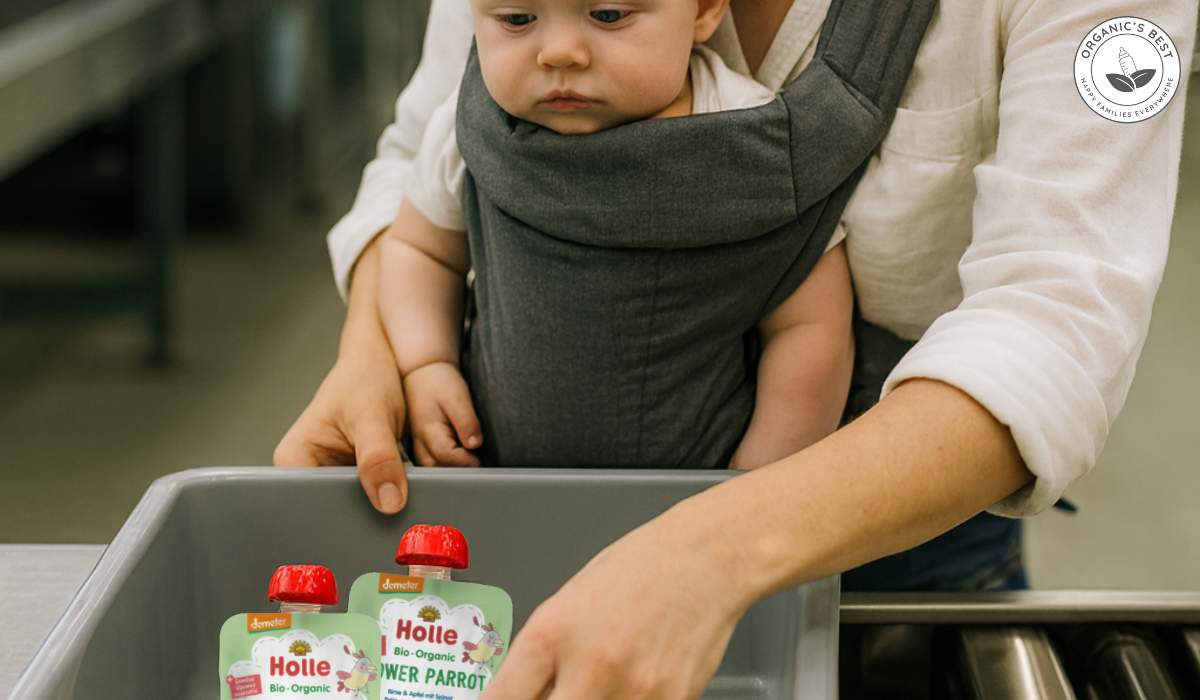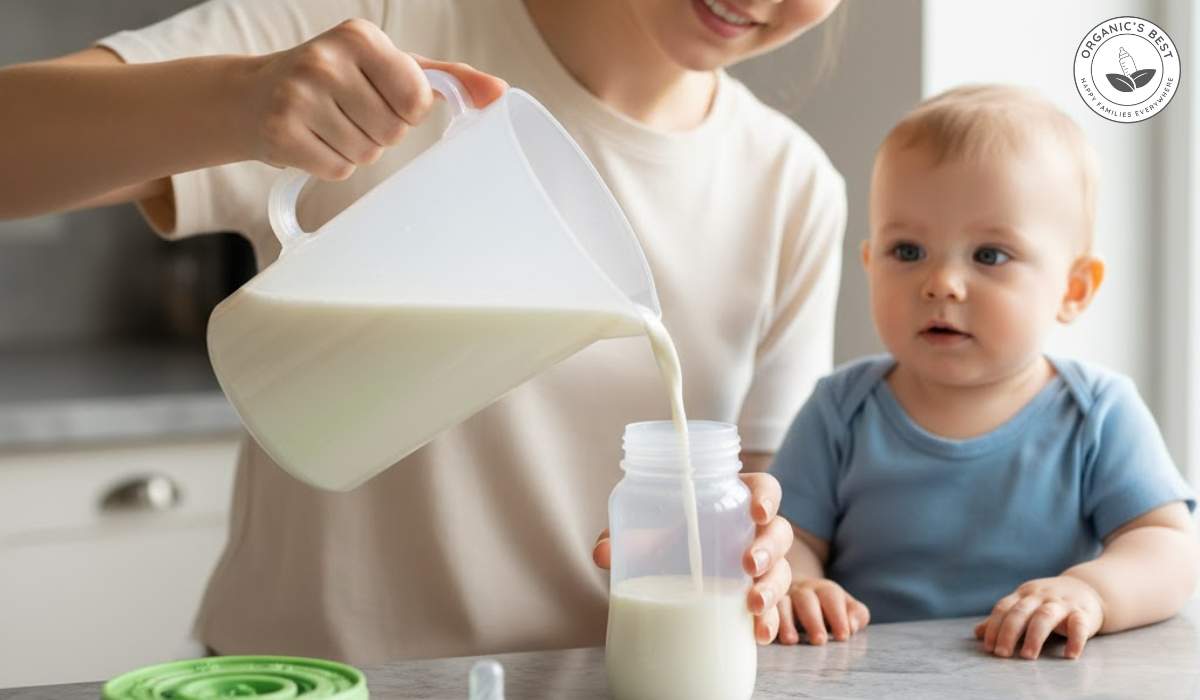Click to Get 2 FREE Boxes/Cans
Only New Customers! Click HERE to Get 2 Extra Boxes/Cans for Free With Your First Order.
BABY FORMULA
Offering new parents top-quality European infant formula from renowned brands like HiPP, Holle, Kendamil, and more. If you’re uncertain about which product to choose, our Formula Finder can help you make the best decision for your baby.
Baby Food
Offering new parents a premium selection of European baby foods, including jars, pouches, cereals, and snacks from esteemed brands like HiPP and Holle.
10 Things to Expect in Your Newborn’s First Week
by Agustina Fernandez July 01, 2025 9 min read

Now that your tiny human has officially arrived Earthside, the parenting adventure truly begins. It's normal to feel a little overwhelmed caring for your newborn baby, but with a bit of knowledge, you'll find your footing. That first week might feel like a blur, but trust us, each day gets a little easier!
In this article, we'll guide you through what to expect during that very first week of newborn bliss, from the sweet snuggles to the sudden cries, the endless diaper changes to the rare moments of shut-eye.
Table of Contents
- Introduction to New Parents
- 1. Newborn Sleep Patterns: Expect Short, Frequent Naps
- 2. Newborn Feeding Schedule: Every Few Hours - Day and Night
- 3. Umbilical Cord Care and What's Normal
- 4. Newborn First Poop: It Might Surprise You!
- 5. Newborn Crying: Learning to Understand Their Cues
- 6. Newborn Skin Conditions: Rash, Baby Acne, and More
- 7. Newborn Reflexes You Might Notice: Startle Reflex
- 8. Bonding with Your Baby and Early Eye Contact
- 9. Doctor Visits and Newborn Screenings
- 10. Postpartum Care: Moms' Recovery and Emotional Changes
- Final Thoughts on Newborn Babies
Introduction to New Parents
Before we dive into the nitty-gritty of what to expect from a newborn baby, we want to start with a heartfelt congratulations. This is a huge milestone in your life! While we can share some common experiences that many new parents go through, it's essential to remember that every first week looks different. Factors like how you gave birth, prematurity, or any health concerns for you or your baby can all shape this early chapter. So above all else, be kind to yourself, and take it one step at a time.
The first week with a newborn baby can feel like a whirlwind, totally exhausting, emotional, and completely transformative. You might find yourself cycling through joy, anxiety, and sleep-deprived confusion in the span of a single day. That's completely normal.
The key is not to aim for perfection, but to be present. Prioritize rest and self-care where you can, and don't hesitate to ask for support. You're not expected to do this alone.
Knowing what to expect in these early days can ease uncertainty and help you focus on what matters most-bonding with your baby. To feel more prepared, consider exploring resources from the American Academy of Pediatrics. Their evidence-based guidance covers everything from breastfeeding and diapering to sleep safety and newborn care.
Below you'll find general newborn guidelines for feeding, sleeping, bonding, diaper changing, and more!
1. Newborn Sleep Patterns: Expect Short, Frequent Naps
Forget long stretches of rest because newborns tend to sleep in short bursts, usually ranging from 30 minutes to 3 hours at a time. This broken-up pattern is normal and necessary as your baby adjusts to life outside of the womb.
You can expect your baby to sleep a total of 14-17 hours per day, all around the clock. Newborns don't yet have a circadian rhythm like us, so their sleep patterns won't follow a typical day/night schedule just yet.
During the first week, your baby will wake often for feedings and comfort. Don't be alarmed if they seem to sleep all day and stay up at night, as this is a common pattern for a newborn's sleep schedule. Over the coming weeks, their internal clock will begin to adjust and get more in sync with yours.
We know that adapting to these new sleep patterns may shake up your world a bit, especially after the pregnancy and birthing experience. To cope with this fragmented sleep, try to rest whenever your baby does, even if it's during the day. Share nighttime duties with your partner if possible, and don't hesitate to ask family or friends for help with meals or household tasks so you can focus on recovery and bonding.
2. Newborn Feeding Schedule: Every Few Hours - Day and Night
Feeding your baby is one of the most important and time-consuming aspects of the first week. Whether breastfeeding - formula-feeding, or combining both, your newborn will need to eat every 2 to 3 hours as part of a newborn formula-feeding schedule.
Breastfeeding 1-Week-Old Baby
In the early days, your baby may nurse 8 to 12 times every 24 hours. These frequent feedings help your body establish and regulate milk production. Don't fret if your baby feeds often or for short periods; their stomach is very small, and it empties quickly.
Look for signs of hunger such as lip smacking, rooting, and sucking on hands. Try to feed on demand rather than on a strict schedule. A proper latch is essential to prevent nipple pain and ensure efficient milk transfer. If you're struggling, don't hesitate to consult a lactation consultant or healthcare provider, as getting enough milk into that tiny tummy is imperative for healthy growth and development during these formative first few weeks.
Formula Feeding: Best Formula for Newborns
Formula-fed babies usually take 1.5 to 3 ounces per feeding every 2 to 4 hours. Like breastfeeding, you should be bottle feeding newborns on demand, watching for hunger cues and signs of fullness.
While there are plenty of go-to formulas for health-conscious parents, the following are some of our favourites:

HiPP Cow PRE
HiPP Cow PRE is a gentle, organic formula designed to closely mimic the composition of breast milk, making it ideal for newborns from day one.
Holle Cow PRE
Holle Cow PRE is crafted from Demeter-certified milk that meets the world's strictest organic certification standards, featuring a carefully curated selection of minimal and thoughtfully chosen ingredients.
Holle Goat PRE
Holle Goat PRE offers a closer match to breast milk, thanks to its similar protein makeup that makes it particularly easy for tiny tummies to digest.
Remember to always prepare your baby's formula according to the manufacturer's instructions and consult your pediatrician if you suspect any allergies or digestive issues. Formula feeding may take some trial and error to find the right product for your baby.
3. Umbilical Cord Care and What's Normal
Your baby's umbilical cord stump is a small remnant of their connection to you during pregnancy. It usually dries up and falls off within the first 5 to 15 days after birth. Until it does, it's important to keep it clean and dry to avoid infection.
Use a soft, damp cloth to gently clean around the base of the cord. Avoid using alcohol unless directed by your pediatrician, and refrain from submerging your baby in a bath until the stump has fully fallen off. Instead, you can give gentle sponge baths.
Don't be alarmed if you notice a bit of blood or scabbing as the stump dries out. However, if you notice foul-smelling discharge, redness, swelling, or persistent bleeding, contact your healthcare provider right away.
4. Newborn First Poop: It Might Surprise You!
Your baby's first newborn poop is called meconium, and seeing it for the first time can be a bit shocking. It's sticky, tar-like, and a dark green or black colour. A baby's first poop is made up of everything your baby ingested in the womb, including amniotic fluid and skin cells.

Meconium typically passes within the first 24 to 48 hours after birth. As your baby begins feeding, their stools will change. Breastfed babies tend to have yellow, seedy, and loose stools, while formula-fed babies may have tan, brown, or greenish poop with a slightly firmer consistency.
Don't be surprised by frequent diaper changes, it's common for newborns to poop multiple times a day. Monitor your baby's output and talk to your pediatrician if they go more than a day or two without a bowel movement, or if you notice mucus, blood, or a strong odour.
5. Newborn Crying: Learning to Understand Their Cues
Crying is your newborn's way of communicating. At first, all newborn baby crying may all sound the same. But, over time, you'll learn to differentiate between types of cries as they become a signal for hunger, discomfort, fatigue, or overstimulation.
Some common reasons babies cry include:
-
Hunger
-
A dirty or wet diaper
-
Gas or tummy discomfort
-
Need for warmth or closeness
-
Sleepiness
It's okay if you don't always know what the cry means right away. Holding, swaddling, rocking, or gently shushing can help soothe them. Skin-to-skin contact is also incredibly comforting and beneficial.
If you notice that your baby cries for more than three hours a day and is difficult to console, they may be experiencing colic, in which case you should speak to your pediatrician.
6. Newborn Skin Conditions: Rash, Baby Acne, and More
Newborn skin is sensitive and adapting to the environment outside the womb. During your baby's first week, you might notice the following:

-
Peeling Skin: Especially on hands and feet, which is normal and doesn't require treatment.
-
Baby Acne: Small red or white bumps that usually resolve within a few weeks.
-
Milia: Newborn milia are small, pale white or yellowish bumps frequently found on a baby's face, especially around the nose, cheeks, and chin.
-
Erythema Toxicum: A common newborn skin rash that looks like red blotches with white or yellowish bumps.
To care for your baby's skin:
-
Avoid frequent bathing (2-3 times per week is enough, and remember, sponge baths are fine in the beginning)
-
Use fragrance-free, hypoallergenic products
-
Keep the diaper area clean and dry to prevent diaper rash
If you see signs of infection, such as oozing, severe redness, or fever, consult your pediatrician.
7. Newborn Reflexes You Might Notice: Startle Reflex
Your newborn has several primitive reflexes, like the newborn startle reflex, that are a normal part of development. These include:
-
Startle Reflex: Baby throws arms outward when startled by reacting to stimulation, noise, or movement. This reflex actually starts when they are still in the womb.
-
Rooting Reflex: Baby turns their head when their cheek is stroked, looking for a nipple.
-
Sucking Reflex: Strong sucking motion when something touches the roof of the mouth.
-
Grasp Reflex: Baby grabs onto fingers placed in their palm or curls their foot when touched on the bottom of their foot.
These reflexes are a sign of healthy neurological development and typically fade over the first few months of life. They may look sudden or dramatic, but they're completely normal!
8. Bonding with Your Baby and Early Eye Contact
Bonding is the foundation of your relationship with your baby. In the first week, you can begin bonding with baby through simple actions like:
-
Skin-to-Skin Contact: Regulates baby's temperature and heart rate.
-
Talking and Singing: Helps baby recognize your voice and promotes language development.
-
Making Eye Contact: Newborns can focus on objects 8 to 12 inches away, which is perfect for looking at your face while feeding.
-
Responding to Cries: Builds trust and teaches baby that they are safe and well cared for.
If bonding with newborns doesn't feel instant, don't worry. Many parents need time to feel connected, as bonding happens over time with repeated loving interactions.
9. Doctor Visits and Newborn Screenings
Your baby will usually have their first pediatrician visit within the first 3 to 5 days of life. This appointment includes:

-
Weight check to ensure baby is gaining back birth weight.
-
Jaundice screening, especially if the baby appears yellow.
-
Assessment of feeding and diaper output.
-
Review of any concerns with sleep, fussiness, or cord healing.
In some areas, infant screenings are conducted before the baby leaves the hospital and include a heel-prick blood test, a hearing test, and a heart screening. These tests help detect rare but serious conditions early on.
You are welcome to bring a list of questions to your appointment; your doctor is there to support both you and your baby.
10. Postpartum Care: Moms' Recovery and Emotional Changes
There is so much physical and mental change that happens during the childbearing experience. So while it is important to care for your little one, it is also important to pour some of that love back into yourself as you go through postpartum healing.
Physical Recovery
Your body is healing from a major event, whether you had a vaginal birth or a C-section. You may experience:
-
Vaginal bleeding, which can last up to six weeks
-
Cramps as your uterus contracts back to size
-
Perineal pain or stitches
-
Soreness at the C-section incision site
Prioritize rest, hydration, and gentle movement. Use pads instead of tampons, and take pain medication as directed by your doctor.
Emotional Changes
The hormonal shifts and sleep deprivation of early parenthood can lead to intense emotions. The "baby blues" affect up to 80% of new moms and include mood swings, irritability, sadness, etc...
These usually subside within two weeks. However, if symptoms persist or intensify, especially feelings of hopelessness, anxiety, or disconnection from your baby, it could be postpartum depression or anxiety, which may require additional support, either from medication or counseling.
You are not alone, and help is available. Talk to your healthcare provider and reach out to support networks.
Final Thoughts on Newborn Babies
Newborns bring with them a whole new world of love, learning, and change. While the first week may feel like a blur of feeding, diaper changes, and sleepless nights, it's also a time full of firsts. That tiny yawn, the way they grasp your finger, the soft sounds they make as they sleep, these are the beginnings of a bond that will only grow deeper with time.
The early days are challenging, no doubt, but they're also a time of such growth for mom and baby. As you navigate these moments, remember that there is no one "right" way to be a parent. What matters most is that you're present, responsive, and trying your best. Mistakes will happen. Uncertainty will show up. That's okay.
Cherish the quiet snuggles and the sleepy stares. Let yourself rest. Reach out when you need support. Surround yourself with people who lift you up, and trust that you are exactly the parent your baby needs.
|
Disclaimer: Please be aware that this information is based on general trends in babies, and it is not medical advice. Your doctor should be your first source of information and advice when considering any changes to your child’s formula and when choosing your child’s formula. Always consult your pediatrician before making any decisions about your child’s diet or if you notice any changes in your child. Breastfeeding is the best nutrition for your baby because breast milk provides your child with all the essential nutrients they need for growth and development. Please consult your pediatrician if your child requires supplemental feeding. |
Agustina Fernandez
Dr. Agustina Fernandez earned her medical degree from the prestigious Universidad Nacional de Córdoba, Argentina. With a deep-rooted passion for pediatrics, Dr. Fernandez is currently on the path to specializing in children's healthcare. Recently, she has delved into the vital field of infant nutrition. Her research interests include breastfeeding, infant formula, and baby food in little ones’ formative years. Dr. Fernandez's commitment to this area of study underscores her dedication to ensuring the health and well-being of children from their earliest days.
Leave a comment
Comments will be approved before showing up.
Also in Organic Infant Nutrition and Health Blog

Everything You Need To Know About Winter Pregnancy: Essential Tips for Moms-to-be
by Agustina Fernandez December 16, 2025 8 min read
Read More
Can You Bring Baby Food Pouches on a Plane? Essential Tips for Parents
by Agustina Fernandez December 09, 2025 7 min read
Read More
The Formula Pitcher: Is It Safe To Make A Whole Pitcher Of Baby Formula?
by Agustina Fernandez December 02, 2025 8 min read
Read More